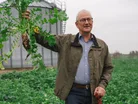Carlsberg: Manufacturing Beer with Regenerative Barley

Carlsberg, the iconic beer manufacturer headquartered in Denmark, has recently made a crucial deal that highlights its dedication to regenerative farming.
This deal involves partnerships with the agricultural cooperative DLG and Viking Malt, in order to revolutionise the sourcing of malt barley cultivated in Denmark using regenerative principles.
This initiative falls in line with Carlsberg's ambitious goal to source all its raw materials through regenerative practices by the year 2040.
The possibilities of regenerative agriculture
Regenerative agriculture goes far beyond traditional farming.
It aims to revitalise soil health, boost biodiversity and enhance water cycles, all while keeping yields efficient.
For Carlsberg, this means adopting cutting-edge farming techniques like minimal tillage or reduced ploughing to help preserve soil structure and limit erosion.
The manufacturers farmers also maintain soil cover throughout 95% of the year and practice crop rotation with at least three different crops over five growing seasons.
The company has also sought to significantly reduce its use of synthetic fertilisers and pesticides.
Carlsberg's initial regenerative project covered 100 hectares across two farms located on the coastal island of Zealand, where Denmark's capital Copenhagen is.
This endeavour produced approximately 500 tonnes of malt, sufficient to brew around 3.3 million litres of beer - more than half the annual beer consumption in Belgium.
Future plans involve using this harvest to manufacture a special edition beer exclusively from regeneratively grown barley by 2025.
Some of the produce is also set to be used to enhance the iconic Carlsberg Pilsner over the next few years.
"Around 24% of Carlsberg's Danish CO2e emissions come from agriculture, which supplies the raw materials for our various products," says Peter Haahr Nielsen, CEO of Carlsberg Denmark.
"We, therefore, see great potential in converting to regenerative agriculture to reduce our CO2 emissions and to contribute positively to biodiversity."
Aiding in the journey to net zero
This project not only helps Carlsberg cut down its carbon footprint but also aligns with its global sustainability goals encapsulated in the 'Together Towards ZERO and Beyond' strategy, which has already introduced regeneratively sourced products in several European countries.
The transition, however, isn't devoid of challenges.
There's currently no established standard for regenerative materials and methods.
To tackle this Carlsberg has collaborate dwith the agricultural consultancy Agrovi to tailor regenerative cultivation specifications to Denmark's agricultural landscape.
This initiative fosters crucial collaborating, helping to build the future of sustainable manufacturing in the agricultural sector.
"There is a huge business potential for regenerative crops, which we believe is an important part of the transformation that agriculture is facing," says Bøje Kjær, Executive Vice President of DLG Denmark.
“The next step is to get more food companies on board who can see the same added value as Carlsberg and Viking Malt."
Sustainable manufacturing bolsters agricultural strength
Regenerative agriculture is not just about enhancing sustainability; it's also about building resilience in the face of climate change.
This sustainable manufacturing will help farms withstand erratic weather patterns, including droughts and excessive rainfall, ensuring a consistent production of quality barley crucial for brewing.
Carlsberg assures its consumers that the switch to regenerative barley will not influence the taste of their beer, maintaining the flavour profile that its consumers trust.
The proactive steps taken by Carlsberg signify a potential shift in broader industry practices and demonstrate how sustainability can lead to robust, industry-wide changes.
"There are several challenges to overcome in the coming months and years, including common principles," says Simon Boas Hoffmeyer, Senior Director of Sustainability & ESG for Carlsberg Group.
"We need scale to increase impact. For this to happen, we need more value chain partners and crops to join the transition."
Make sure you check out the latest edition of Manufacturing Digital and also sign up to our global conference series - Manufacturing LIVE
Manufacturing Digital is a BizClik brand.


